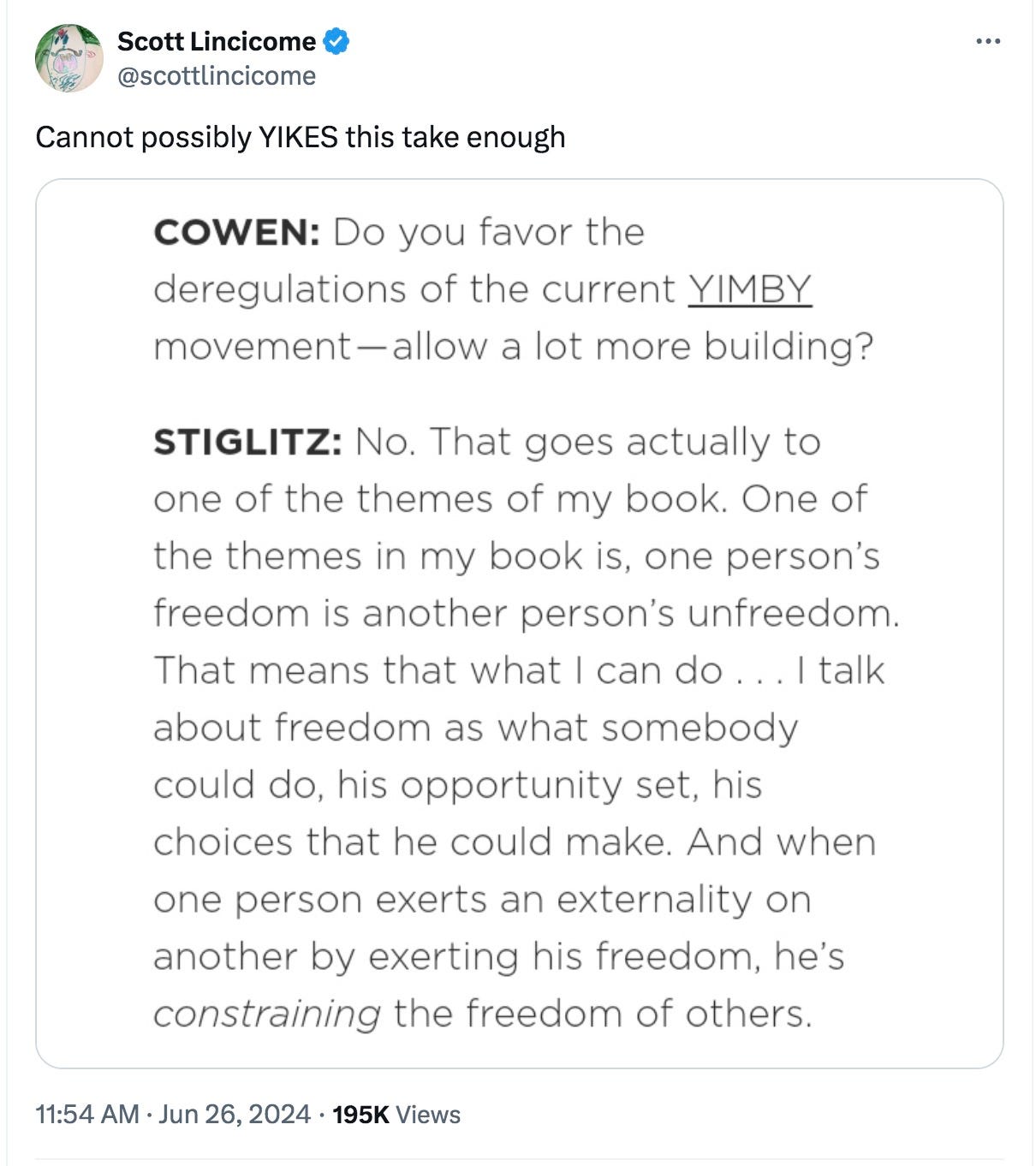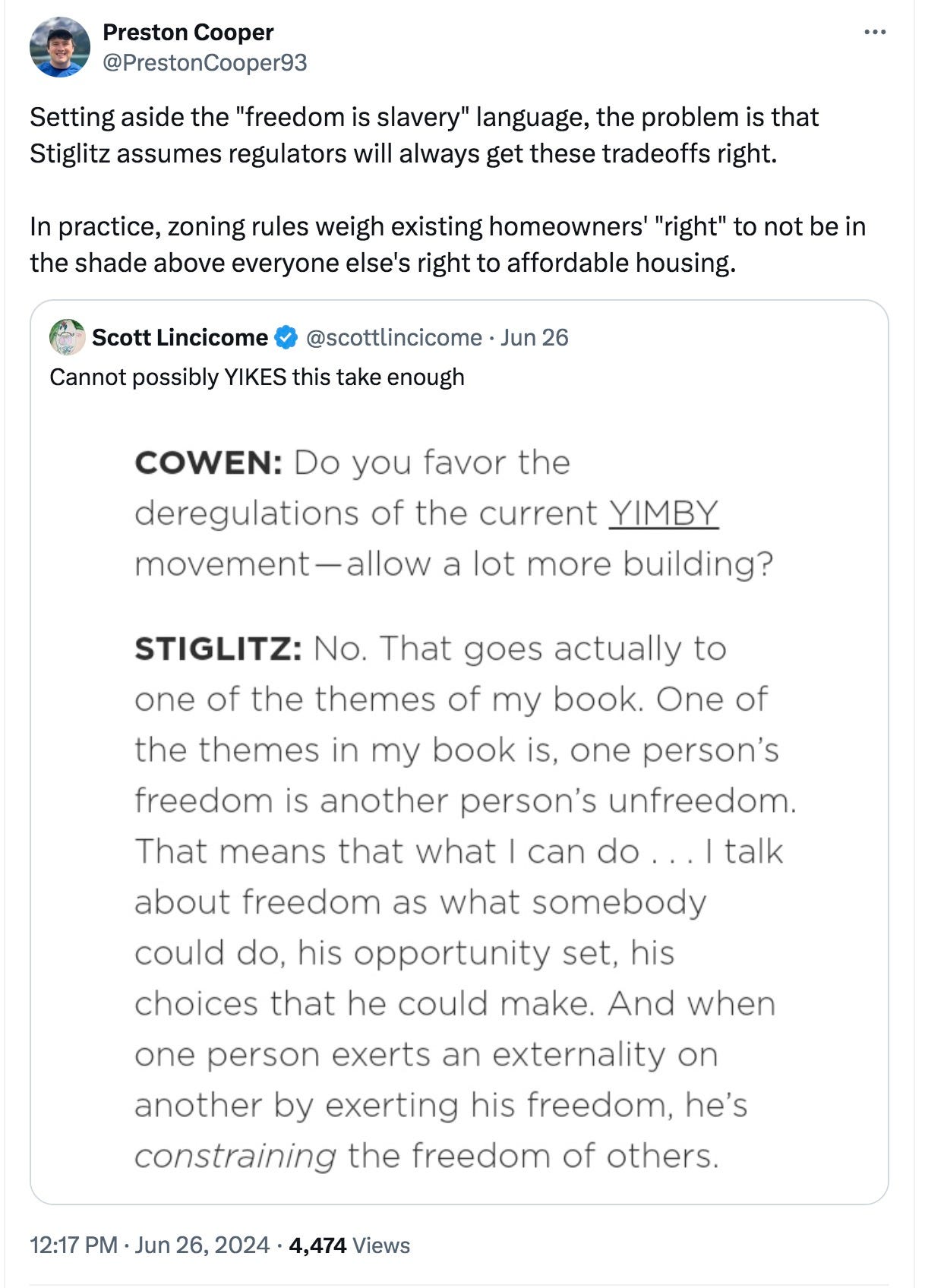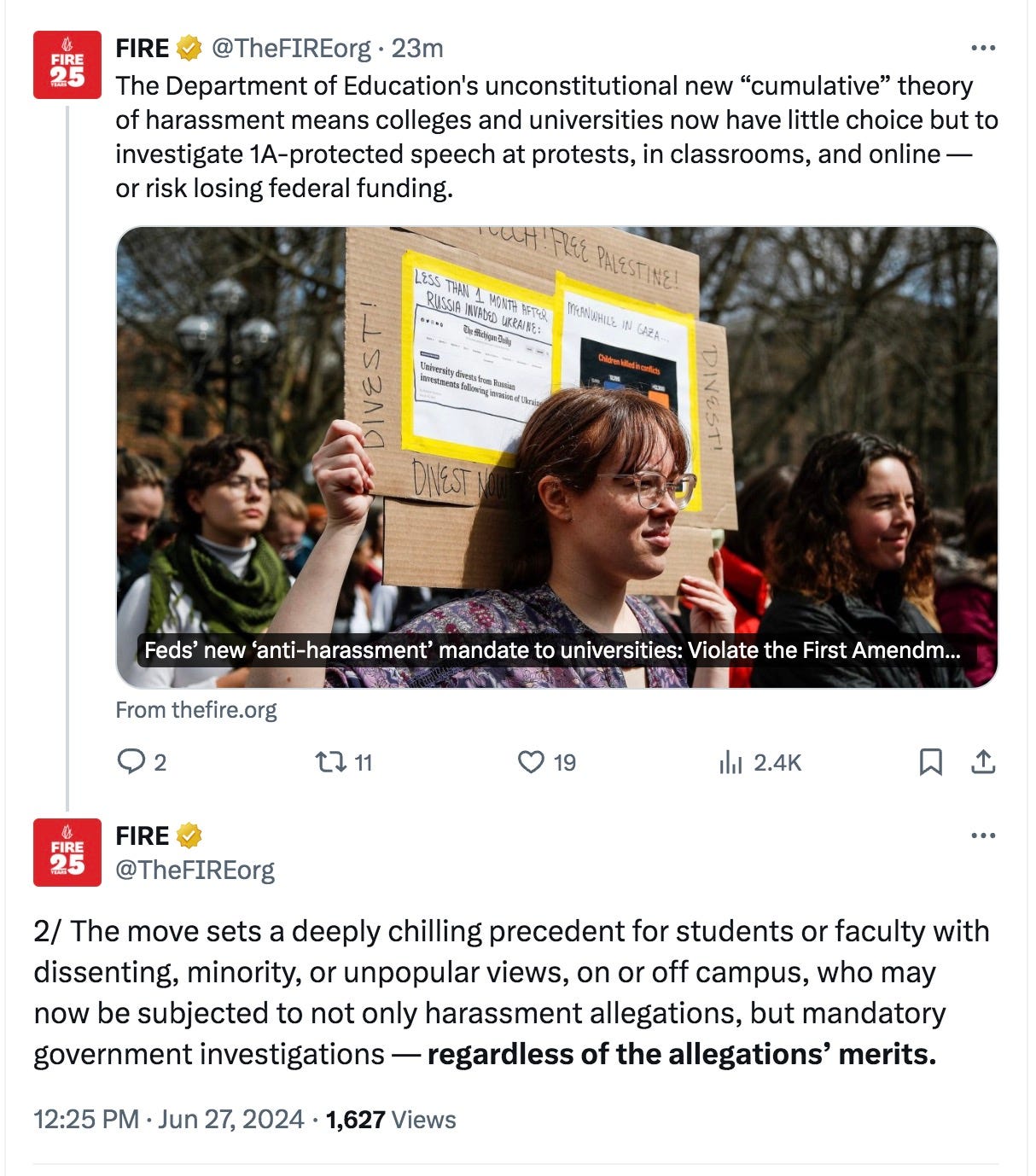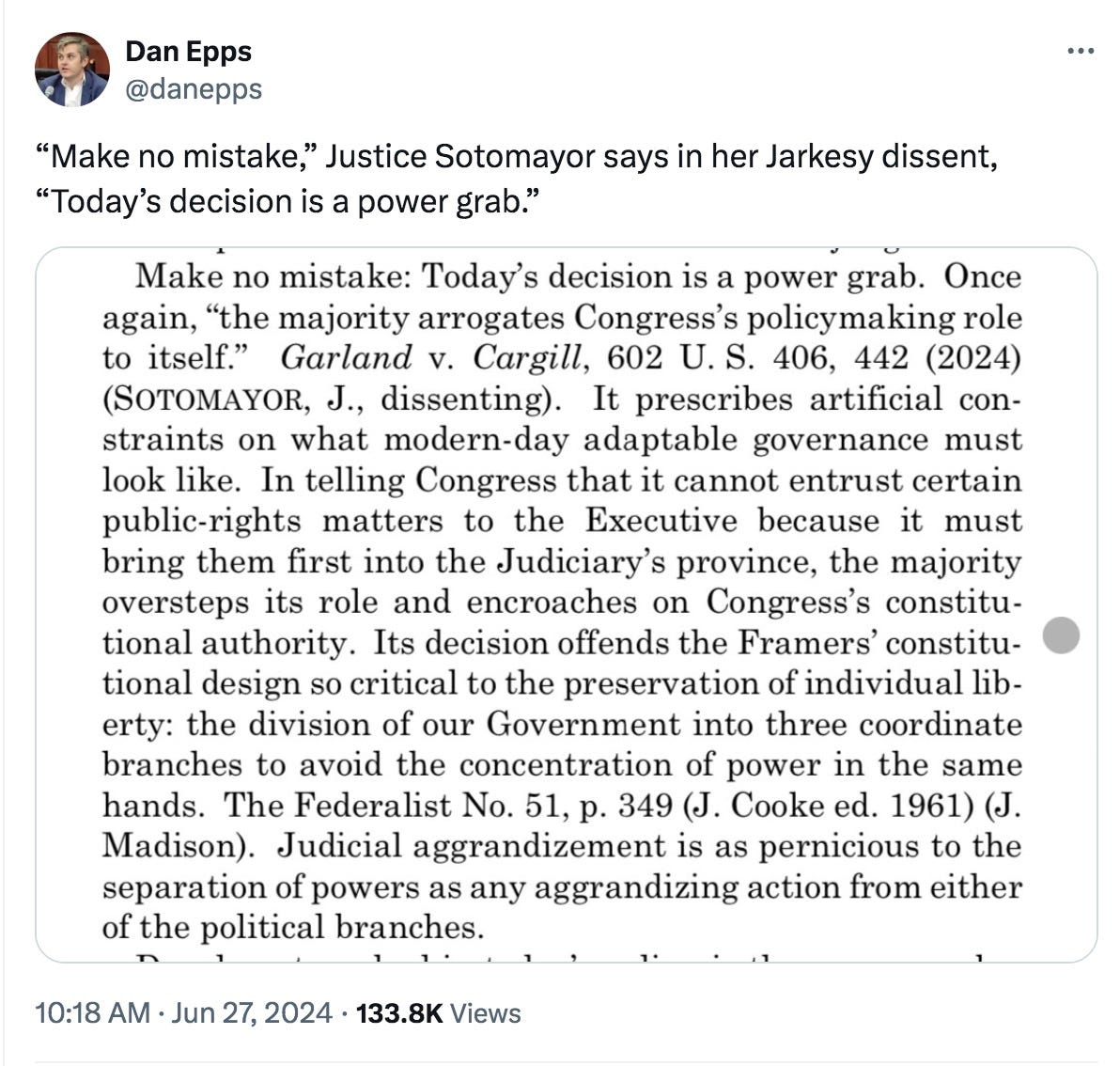E-Pluribus | June 27, 2024
A serious discussion about flippancy; governments against truth; and SCOTUS punts.
A round-up of the latest and best musings on the rise of illiberalism in the public discourse:
Aaron Pomerantz: Flippancy Is Destroying Public Discourse. Here’s How We Can Fix It
Sarcasm and flippancy are nothing new and can add interest and humor to our communications. But there are limits, says Aaron Pomerantz at Real Clear Politics. Particularly if the primary use of flippancy is to damage one’s opponent rather than further one’s point of view, everyone can end up worse off.
As a psychologist and leadership researcher, I help leaders develop self-awareness, humility, and the ability to unite people to achieve common goals. Without these, effective leadership becomes impossible. Unfortunately, these qualities are startlingly absent from those leading American public discourse.
Incivility has become a buzzword in American politics, with polling data indicating it to be one of voters’ primary concerns. However, paradoxically, media outlets like Not the Bee, or their left-wing equivalents like Occupy Democrats or the Young Turks actively exacerbate the problem and become very popular for doing so. Popular discourse is dominated by provocateurs like Candace Owens, Matt Walsh, Jon Stewart, and John Oliver, who thrive on making edgy, often insulting statements about their political opponents. This flippancy doesn’t challenge or develop its audience, but simply reinforces their personal prejudices about the ridiculousness of their political foes. If the goal is a more civil society, then the leaders of our popular discourse could not be doing a worse job at accomplishing it.
Christian author and apologist C.S. Lewis described the dangers of flippancy in his book “The Screwtape Letters”: “Among flippant people … every serious subject is discussed in a manner which implies that they have already found a ridiculous side to it … [Flippancy] is a thousand miles away from joy: it deadens, instead of sharpening, the intellect; and it excites no affection between those who practise it.”
As Lewis points out, while some forms of humor can unite and even foster self-reflection, flippancy divides and reinforces one's own sense of superiority.
[. . .]
Effective change requires active engagement with diverse viewpoints through meaningful conversations with those with whom we disagree. Insults like those that Not the Bee threw at David French aren’t going to change anyone’s mind. Instead, positive change will require (dare I say it) civil discourse, marked by empathy and mutual respect even between those with fundamental disagreements. Such engagement might be impossible on the Internet (although it would be nice to see some good-faith attempts at it), but it is very much possible – and fundamentally important – in the real world.
Read it all.
Aaron Sarin: The War Against Truth
The Soviet Union’s use of propaganda and disinformation was legendary. At Quillette, Aaron Sarin says China was taking notes and post-Soviet Russia hasn’t exactly abandoned the old techniques either. Authoritarian governments undermine the very foundations of truth to obscure their constant lust and quest for power.
[T]he CCP has been learning from the old Kremlin school of information warfare. If public attention can be continually misdirected, then regimes like those in China and Russia stand to profit. Evidence for a planned invasion of Taiwan can be dismissed as US propaganda, and if it actually happens, the invasion can be interpreted as a US masterplan (Biden forced him to do it).
Beijing and Moscow will also reap long-term benefits from successful misdirection. These leaders dream of a world without universal standards; a world in which no one can say what the truth is. (I recall a Chinese acquaintance once asking rhetorically: “What is truth?” She meant it not as philosophical enquiry, but rather as conversation-stopper. Her implication was that no one can possibly know the truth and it would be useless to explore the question.)
In Xi’s hoped-for world, each government would be left alone to commit crimes within its own borders, according to its own moral code, free from international opprobrium. Back in the Party’s earliest days, Mao taught that there is no such thing as human nature in the abstract, and Xi has since followed his lead, identifying the concept of “universal values” as one of the greatest threats to CCP rule. This latest portrayal of the United States as a scheming warmonger slots into his general narrative: universalism is a lie designed to benefit the West, human-rights issues are always just a pretext, everyone is a cynic, no state can claim moral superiority over the PRC. And what is truth anyway?
Today, as China’s president informed a seminar of CCP officials, “the most important characteristic of the world is, in a word, chaos, and this trend appears likely to continue.” Unlike Mao, Xi has always given the impression of a personality inclined towards nitpicking order, but he is adaptable enough to take eager advantage of the opportunities presented by this new age of tumult. The goal is to conceal reality, to confuse the public—a constant misting of the windows. Chaos in the service of deceit.
And so, the CCP uses fake accounts to promote pro-Palestinian voices on social media, eagerly encouraging the chasmic divisions that Israel’s war is now opening up in Western society. Beijing calls for a ceasefire in Ukraine, urging restraint and offering peace plans, and at the same time, it prolongs the war by supplying Russia with dual-use goods for the manufacture of gun barrels and casings, aircraft engine parts, and components for tanks and missiles.
Read it all here.
James Freeman: Supreme Majority: Today Is Just Not the Day to Defend Free Speech
You can’t win ‘em all, but you can try. James Freeman at The Wall Street Journal writes that the Supreme Court handed free speech advocates a disappointing loss in its recent Covid-related decision in MURTHY v. MISSOURI.
Nearly a year ago this column celebrated the beautiful birthday gift that U.S. District Judge Terry Doughty gave to America in slapping down the Biden administration’s rank abuse of First Amendment rights in pressuring social media companies to censor speech. Now the Supreme Court hasn’t exactly forced a complete return of the gift but has raised the question of whether America will ever be able to accept it.
After taking the important case, a 6-3 majority fronted by Justice Amy Coney Barrett—and including the Court’s three leftists plus Chief Justice John Roberts and Justice Brett Kavanaugh—has essentially avoided addressing all the fundamental questions by making a tortured argument that the particular plaintiffs involved didn’t have the standing to serve as plaintiffs.
Jan Wolfe reports for the Journal: “The Supreme Court on Wednesday rejected a lawsuit alleging that Biden administration officials unlawfully pressured social-media platforms to remove content flagged as disinformation, ruling that neither the two states nor five private parties who brought the claim had any right to get their allegations before a judge.”
The lawsuit, spearheaded by Republican state attorneys general in Missouri and Louisiana, had fared well in the lower courts, at one point resulting in an unprecedented injunction that blocked top government officials from communicating with social-media companies about removing “content containing protected free speech” from their platforms.
The majority opinion reads like an argument reverse-engineered to allow justices to dodge their fundamental duty to defend our most precious liberties—and the open debate on which our society and the advance of human knowledge and civilization depend. The justices appear to be resting much of their restraint in defending our rights on an assumption that the most aggressive government efforts to lean on tech platforms during the Covid era have eased and are unlikely to be repeated. But of course they will be repeated if such abuses are not punished. Ilya Shapiro writes on X:
In the term’s much-anticipated social-media-regulation case, the Court took the easy way out by not deciding the key issue. Instead of updating the rules on jawboning—government pressure on businesses to do its bidding—for the digital age, a 6-justice majority simply kicked the case on standing grounds…
That’s a disappointing cop-out: the public deserves to know that their elected officials aren’t doing an end-run around the Constitution by having private actors do its bidding. But also note that this 6-3 vote involved three conservatives joining three liberals—so again attacks on the Court as being a bunch of partisan hacks fall flat.
Instead it looks like six justices acting as a bunch of bipartisan hacks to avoid disrupting the media relations activities of the federal government. The case featured a voluminous record of the White House privately pressuring social media executives to suppress controversial speech. And who can forget the public accusation from President Joe Biden that Facebook was killing people by not censoring as aggressively as he wanted (an outrageous claim that he took days to retract)?
Read the whole thing.
Around Twitter (X)
Scott Lincicome appears skeptical of Nobel prize winner Joseph Stiglitz’s concept of “unfreedom.” Preston Cooper concurs. (Note: For the uninitiated, YIMBY stands for “yes in my back yard".)
Speaking of skeptical, the Foundation for Individual Rights & Expression is looking askance at “cumulative” harassment, a new Department of Education concept:
And finally, in her dissent today, Justice Sotomayor cites separation of powers to argue that the executive branch should be able to usurp judicial branch responsibilities if the legislative branch really wants it to. OK, then.










